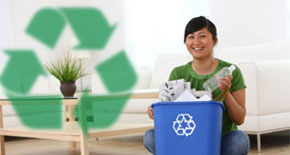ECUA Curbside Recycling: The Proper Way
March 17, 2014
Recycling is one of the best ways to have a positive impact on the community, and recycling is important to the natural environment, according to ECUA.
The ECUA Curbside Recycling Program was launched in January 2009, as part of the regular ECUA residential sanitation service. This simple, voluntary and cost-effective program is being utilized by 65 percent of ECUA customers and continues to grow. A voluntary program assures all participants are willing partners in the recycling process and serves to minimize the contamination of the collected materials, ECUA said.
 ECUA’s program uses a convenient single stream recycling system, which means no sorting is required, and commingled recyclables are sorted at a processing facility. Although sorting is not required, it is very important that only recyclable items be placed in the ECUA-provided recycling container to avoid contamination of the recyclables. In some cases, customers will unknowingly introduce unaccepted and/or tainted items into the recycling process. This reduces the value and potential usability of recyclable materials, and jeopardizes the effectiveness of the ECUA Recycling Program.
ECUA’s program uses a convenient single stream recycling system, which means no sorting is required, and commingled recyclables are sorted at a processing facility. Although sorting is not required, it is very important that only recyclable items be placed in the ECUA-provided recycling container to avoid contamination of the recyclables. In some cases, customers will unknowingly introduce unaccepted and/or tainted items into the recycling process. This reduces the value and potential usability of recyclable materials, and jeopardizes the effectiveness of the ECUA Recycling Program.
ECUA Recycling Coordinator Amanda Handrahan offers these tips to successful recycling: “Make sure all items placed in the recycling container are safe, clean and ready for the recycling process. We don’t accept plastic grocery bags, but we do appreciate when you use them to bag small, lightweight items, to keep them contained within the can. Also, it’s important to remove liquids that can damage paper products, and remove leftover food from take-out containers before placing them in the recycling can.” She adds, “This seems basic but in our busy, everyday lives, it’s always good to have a quick reminder of how to best avoid the possibility of contamination.”
Here’s a list of items accepted in the ECUA’s program, and those that are not:
- Glass; any color
- Newspaper & Inserts
- Magazines & Catalogs
- Junk Mail & Envelopes
- Cardboard
- Phone Books
- Office and School Papers (colored paper)
- Brown Paper Bags (grocery)
- Boxboard (cereal, cake & cracker boxes, etc.)
- Pizza Boxes
- Plastic Produce Clamshells
- Plastics No. 1 through 7
- Plastic Milk Jugs; 2-Liters; bottles and containers
- Plastic & Metal Hangers
- Juice Boxes / Bags
- Plastic Cups, Plates, Utensil
- Aluminum Cans & Lids
- Pet Food Cans and Dry Pet Food Bags
- Aluminum Foil Baking Pans
- Balls of Tin Foil; Foil Pie Tins
- Tin and Steel Cans & Lids
- Metal Pots, Pans & Cookie Sheets
- Bubble Wrap
- Cardboard Egg Cartons
Items Not Recyclable Include:
- No Empty Plastic Bags
- No Ice Cream Cartons
- No Waxy/Paper Milk Cartons
- No Styrofoam products
- No Aerosol Cans
- No Garbage or Yard Waste
- No Garden Hoses
- No Window Blinds
Comments
6 Responses to “ECUA Curbside Recycling: The Proper Way”



Is it ok to put recyclables in a plastic trash bag
cat food cans lined with plastic okay?
water bottles and bottle caps?
water bottle caps on or off?
several cat food cans and lids, plastic lined, washed, in plastic grocery bags?
Single stream recycling is the best. After leaving good old P’cola, I now live in an area that has curbside recycling, but I have to seperate glass, plastic and paper. I still try to do it but I do not always take the time now.
Keep it single stream and keep it green!
In response to Gembeaux: No, the reason that we do not accept polystyrene foam products at this time is because the company that currently processes our recyclables does not accept them.
If it has a recycle emblem printed on it I throw it in the recycle can. Makes sense to me that way
Is the acceptability of styrofoam meat trays, egg cartons, etc., a cost issue? I’ve lived in other areas where these items were accepted in comingled recycleables. Publix accepts them, but that’s a long drive to make just for that, and requires a separate storage here for us.